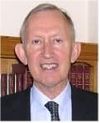God has often moved in a mysterious way, and especially in his choice of Rolfe Barnard to preach the gospel of grace in America during the mid-twentieth century.
Barnard’s was an awakening ministry. He was ‘John the Baptist come to town’. He was, reputedly, the only reformed evangelist in America when Billy Graham was strongly engaged in city-wide, crusade evangelism.
Billy Graham crusades reflected the doctrinal declension of contemporary Evangelicalism. Conversion had become equated with a physical response to the evangelist’s ‘invitation’. There was naive optimism about man’s ability to ‘decide for Christ’.
Nor were these trends resisted by a fundamentalist movement that had doggedly resisted theological modernism, but had also neglected vital aspects of the historic faith, or confessional Christianity.
Early life
Rolfe Barnard was born in Guntersville, Alabama. His parents dedicated him before birth to God. He was baptised as an unconverted boy in a Southern Baptist church.
When he was 11 years old he ‘went forward’ at a missionary meeting, and seemed to sense God’s will that he should be a preacher. But he rebelled against the idea.
He went to university in Texas when 15, and there, whenever he thought of God, was challenged by the thought of preaching. He evaded the issue by every device, including long hours of prayer.
His rebellion turned to outright atheism and he abandoned all pretence of faith in God. An atheists’ club was organised and he became its president.
On Friday nights 300 students gathered to poke fun at the Bible, led by Barnard. But at night the God of his parents loomed large in his thoughts.

He would curse God during the day and pray to him at night. ‘I say to you, and this is the truth, before I could sleep at night I’d get down on my knees and say to God, “If you’ll not kill me tonight, I’ll surrender to you tomorrow”.’
On graduating, he moved to Panhandle, Texas, to become a schoolteacher. In Texas at that time, this necessitated joining a church, which Barnard duly did.
But he never attended. ‘For years I blasphemed everything high and low, but they kept me on the church roll.’
Conversion
Then a remarkable thing happened. Shortly after he moved to a new location and church, he was asked to teach the men’s Bible class. Unaccountably, he accepted.
As a Bible teacher he was a success. The men were impressed with his Bible knowledge and ability to communicate. But inwardly he was rebelling against God.
Then came the crisis. The pastor resigned, and Sunday after Sunday there was nobody to preach in the church. Barnard’s dilemma proved too great to bear.
One Sunday he went home, entered the bathroom and locked the door. There, as he later said, ‘the battle was fought out’ — and God won!
Barnard went straight to the home of the Sunday school superintendent. He was asleep in a rocking chair waiting for dinner.
Barnard woke him and said, ‘Brother Mills, I’ve come to tell you, the Lord has saved me and I want to preach next Sunday’.

Barnard recalled: ‘The Superintendent said, “Well, it’s about time!” — He sure let me down. I had wanted him to say, “Oh, isn’t that wonderful!” Instead he said, “Well, it’s about time”.’
Some old lady
Barnard continues: ‘I said, “What do you mean?”
‘He said, “Things have been going on. A couple of letters came to Panhandle Texas post office. One of them was addressed to the Superintendent of the Sunday school of the First Baptist Church. The other was addressed to the Pastor.
‘They were identical letters. Some old lady from Abilene, Texas, said, “My boy’s coming to your town to teach school. He’s called to be a preacher. He’s not even saved. He’s in an awful mess”.
‘She said, “If you could find it in your heart, build a fire under him. Don’t let him have a moment’s peace.”
‘And the Superintendent said, “Boy, we’ve been doing it! We knew you weren’t saved, but we elected you to teach a men’s Bible class. We’ve been meeting once a week and asking, “Lord, make the fire a little hotter!” We’ve been waiting.’
The letter had come from Rolfe’s mother. Unorthodox as the method was, God overruled it for his glory.
Sermon on death
Rolfe Barnard moved to teach in Borger, Texas. Here he began extensive evangelistic work, and was commissioned by Baptists to start a church.
Borger was a boom-or-bust oil town, with saloons, gambling dens and brothels, but no churches.
Barnard began collecting money for a church building. He went to solicit a donation from A. P. Borger, who ‘owned the town’.

When Barnard arrived, he found several deputy sheriffs with him, along with a photographer from the local newspaper. The sheriffs were ‘dressed in ten-gallon hats and wearing two handguns’.
He was informed that he could not collect money there until they had been given a sample of his preaching. Barnard immediately mounted a large beer keg and delivered a message on ‘death’.
Those present, he said, were going to die physically, and if they remained outside Christ their souls would die eternally.
The photographer took Barnard’s picture, and next day the newspapers showed young Barnard standing on the keg preaching to his unusual audience.
Death was an appropriate subject, for gases from the oil wells attacked the lungs of Borger’s townsfolk, often with fatal results. Barnard sometimes preached at seven funerals in a day.
His converts consisted of former drunkards, gamblers, prostitutes and money sharks, as well as ordinary people. This early, unusual pastoral experience moulded his ministry.
A second-hand book
In 1928 he enrolled in Southwestern Baptist Seminary at Fort Worth, Texas. On its faculty was a Calvinist called Dr W. T. Conner.
Barnard was an able student. Graduating, he engaged in pastoral ministry, but his gifts were not primarily pastoral and after the Second World War he devoted himself to itinerant evangelism and Bible teaching.
In 1946, he moved to Winston-Salem in North Carolina to teach at Piedmont Bible College. Here he came into close contact with fundamentalist leaders, including Dr John R. Rice.
Something needs to be said here about Barnard’s theological position. During the early years of his ministry he gave ‘public invitations’ after his sermons and was strongly influenced by Finneyism.
But in the late 1940s he happened to purchase ‘for a dime’ a second-hand book of sermons by B. H. Carroll. As he said, just one sentence from a sermon on John 5:25 ‘unlocked everything and “ruined” my ministry’!
Sovereign grace

He restudied Conner, the Puritans and the Reformers and came to the settled conviction that sovereign grace was the message of the Bible. He began to preach his new discoveries.
The defining moment came at the Fundamentalist ‘Sword of the Lord’ Conference at Tocoa Falls, Georgia, in summer 1949.
The conference was dedicated to soul-winning techniques. The 1949 speakers were Dr John Rice, Lee Roberson, Bill Rice, E. J. Daniels and Rolfe Barnard. Barnard was to be the first.
When he began preaching he asked all the young preachers to open their Bibles to Roman 9 and all the old preachers to keep theirs shut, since they would not believe anything he was going to say! Everyone opened his Bible!
He preached for an hour on sovereign grace and by the next morning the conference was in turmoil. By the middle of the week Dr Rice had asked Barnard to leave.
Ashland
Soon afterwards, Pastor Don Wells of Pollard Baptist Church in Ashland, Kentucky, secured Rolfe Barnard’s services as an evangelist.
On Easter Sunday morning 1950, Barnard came to the Ashland church. Nearly a thousand people were gathered.
As Barnard stood up to preach, he said in a low voice: ‘I don’t know why I am here, but I’m sure it has something to do with the foreordaining purposes of God’.
Then he asked: ‘Can anyone here quote Romans 8:28?’
The young assistant pastor, Henry Mahan, stood and quoted the verse, but left out the last phrase.
Barnard asked him if that was all he knew of that verse. Henry replied: ‘Yes’. Then Barnard said: ‘Let me quote the verse for you’.
He began quoting the verse slowly: ‘for all things work together for good to those who love the Lord, to those called according to his…’
Then, when he came to the word ‘purpose’, he bellowed it at the top of his voice.
Then he looked at Mahan and said: ‘Young man, when you understand the meaning of that word “purpose” you will have the key that unlocks the Book of Romans and the whole Bible’. Then he preached on sovereign grace.
Many of the congregation were deeply disturbed, but others were hungry for more.
From then on Rolfe Barnard was ostracised in fundamentalist circles as a ‘hypercalvinist’. But during the 1950s and 1960s God greatly blessed his labours.








